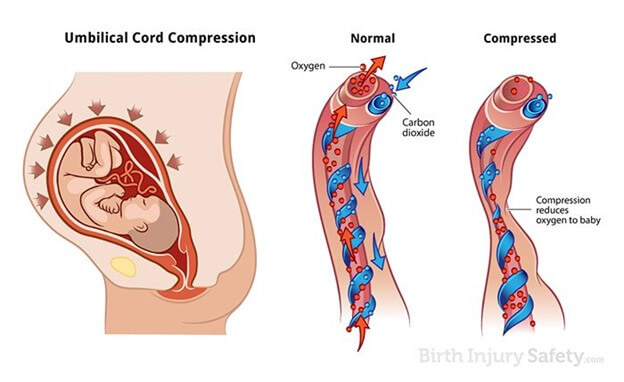Introduction
Introduction ( 5 Questions)
A nurse is monitoring the fetal heart rate of a client who has ruptured membranes.
The nurse notices severe variable decelerations on the monitor.
What is the most likely cause of this finding?
Fetal head compression causes early decelerations, which are symmetrical decreases and return-to-normal of the fetal heart rate that is linked to uterine contractions. Early decelerations are benign and do not affect fetal oxygenation.
Uteroplacental insufficiency causes late decelerations, which are gradual decreases in fetal heart rate after a uterine contraction. Late decelerations may indicate that a fetus has high levels of acid in the blood (a condition called impending fetal academia), which is often caused by a lack of oxygen.
Variable decelerations are abrupt drops in the fetal heart rate below baseline that last 15 seconds to less than two minutes. They are caused by reduced blood flow and oxygen delivery to the fetus due to umbilical cord compression. The onset, depth, and duration of variable decelerations vary with uterine contractions or fetal movement. They can be periodic or episodic.
Maternal hypotension can cause late decelerations, not variable decelerations. Maternal hypotension can reduce the blood flow to the placenta and affect fetal oxygenation.
The correct answer is choice C. Umbilical cord compression. Variable decelerations are abrupt drops in the fetal heart rate below baseline that last 15 seconds to less than two minutes. They are caused by reduced blood flow and oxygen delivery to the fetus due to umbilical cord compression. The onset, depth, and duration of variable decelerations vary with uterine contractions or fetal movement. They can be periodic or episodic.
Choice A is wrong because fetal head compression causes early decelerations, which are symmetrical decreases and return-to-normal of the fetal heart rate that is linked to uterine contractions. Early decelerations are benign and do not affect fetal oxygenation.
Choice B is wrong because uteroplacental insufficiency causes late decelerations, which are gradual decreases in fetal heart rate after a uterine contraction. Late decelerations may indicate that a fetus has high levels of acid in the blood (a condition called impending fetal academia), which is often caused by a lack of oxygen.
Choice D is wrong because maternal hypotension can cause late decelerations, not variable decelerations. Maternal hypotension can reduce the blood flow to the placenta and affect fetal oxygenation.

